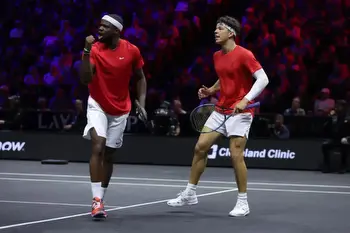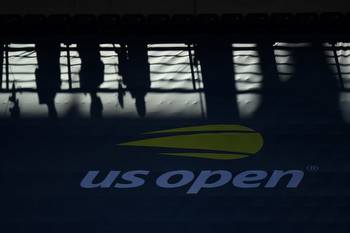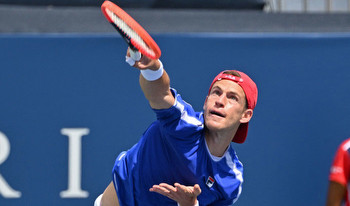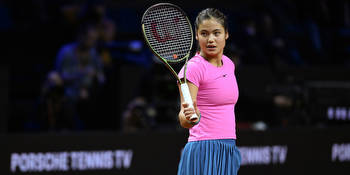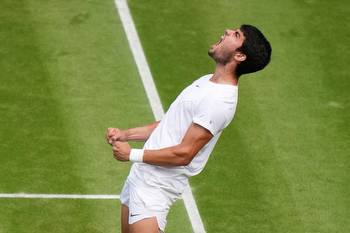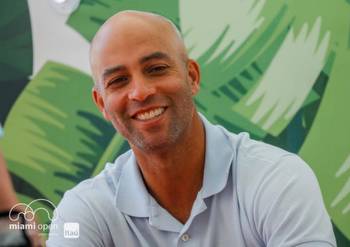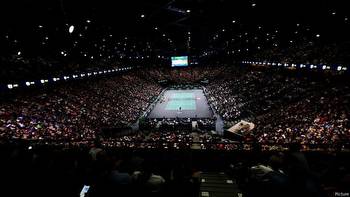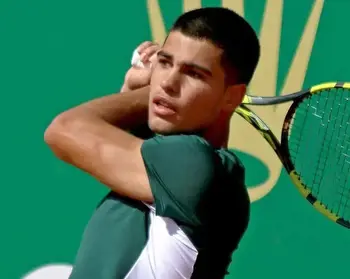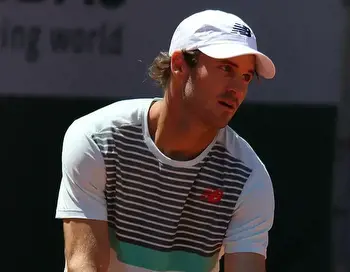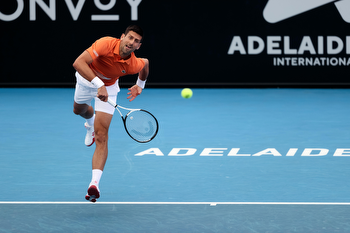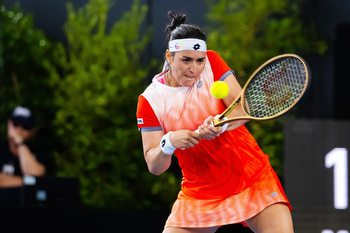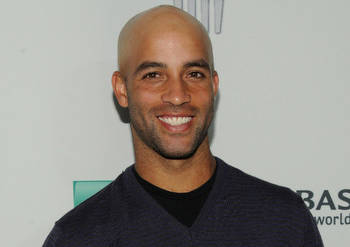Georgia Tech "Wild Card" Tournament Would Add Excitement, Ease Controversy For Atlanta Open
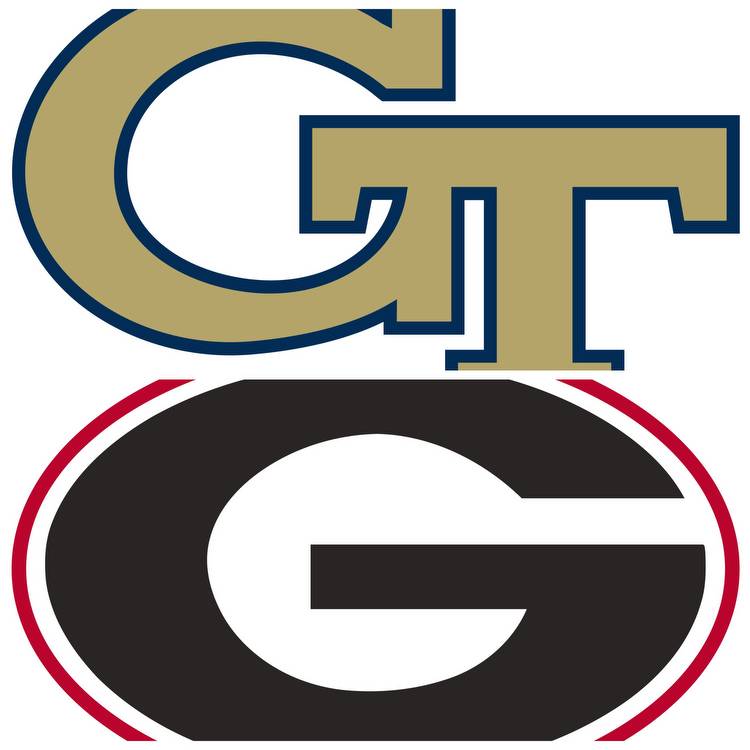
Home » A Georgia – Georgia Tech “Wild Card” Tournament Would Add Excitement, Ease Controversy For Atlanta Open
By Randy Walker
@TennisPublisher
There was some controversy with regard to the wild cards that were given out at the 2023 Atlanta Open tennis championships. It initially left out local NCAA singles champion Ethan Quinn of the University of Georgia, who was passed over in favor of Andres Martin the No. 1 player from Georgia Tech who lost in the first round of the NCAAs, as well as Atlanta native, former Georgia Tech star, recent first-time ATP titlist and eventual Wimbledon quarterfinalist Chris Eubanks.
Wild cards are a sensitive subject and often controversial. Roger Federer once compared wild cards to wedding invitations where the people not invited, who don’t make the cut, are not going to be happy. On the ATP and WTA tours, tournament directors will often award wild cards to players who will enhance attendance and buzz for their event. Sometimes one is given to a star player whose ranking has dropped and preventing direct entry. Or a wild card is offered to a star player who did not originally enter the event but wants to play at the last moment. Other times it is given to a deserving local player who will also help sell tickets locally.
The Atlanta Open, under former tournament director Eddie Gonzalez, implanted a “college night” program where the event would alternate awarding wild cards to players from the University of Georgia and Georgia Tech. This was done on an alternating basis, but what happens in a year where a player from one school is more “deserving” of the wild card when it’s the other schools turn to receive the wild card? The issue can up this year under new tournament director Peter Lebedevs when, technically, it was the University of Georgia’s turn to receive the main draw wild card and its top player Ethan Quinn was the NCAA singles champion. The issue brought up a potential Tennis Anti-Corruption violation as discussed here: http://www.worldtennismagazine.com/archives/22193 (As it turned out, Quinn got a last second wild card when John Isner received a special exemption entry, thus opening up the wild card he received.)
But there is an easier way to resolve this Georgia vs. Georgia Tech wild card issue at the Atlanta Open that would avoid controversy and create bigger buzz and anticipation for the tournament – have the players play for it via a special wild card tournament. Gather the top four players from each respective team and play a three-day wild card event, alternating between playing it at the Georgia Tech and UGA tennis facilities, where the winner of the event gets the main draw wild card and the runner-up gets a qualifying wild card. It would provide for great pre-promotion and buzz for the event, with a lot of pre-event chatter and anticipation. The Georgia vs. Georgia Tech rivalry is strong in the state of Georgia. In football, it’s called “Clean, Old Fashioned Hate.” This trickles down to other sports too, including tennis. The 2023 Georgia vs. Georgia Tech tennis match held indoors at Georgia Tech was at fan capacity – even all-time Georgia tennis legend Al Parker had a hard time getting in for the match! This wild card event could add a new twist to the rivalry with spots in the Atlanta Open as the prize.
The quarterfinal match-ups for this special wild card event could be, in draw order, UGA No. 1 vs. Tech No. 4, UGA No. 2 vs. Tech No. 3, UGA No. 3 vs. Tech No. 2 and UGA No. 4 vs. Tech No. 1. You could also pair this event down to just the top two players from each school, if there are time or schedule constraints. You can also perhaps have a clause in the rules of the wild card event that if a Georgia Tech or UGA player wins the NCAAs, they automatically get the main draw wild card and the aforementioned wild card event would only be for a qualifying wild card.
There are increased number of “wild card” tournaments in pro tennis and many feel there should be more. A former top USTA junior and college All-American texted me that he believes part of the reason why there is an increased number of American players in the top 100 are due to competitive opportunities for wild cards. In particular, the USTA holds wild card “challenges” for three Grand Slam tournament opportunities. For the U.S. Open, the USTA awards a wild card to the highest ranking point winner for summer hard court events for players not already accepted into the main draw of the event. Since the USTA has reciprocal wild card relationships with the Australian Open and French Open, it holds similar “challenges” for those wild card spots. Of interest is that Chris Eubanks earned the Australian Open wild card via one of these challengers. (technically, he finished second to Ben Shelton, who actually earned a direct entry due to his strong results and did not need the wild card). Can you say that Chris Eubanks became a much better player perhaps partially because of this “quest” last Fall that got him into the Australian Open and helped he reach the quarterfinals of the Miami Open and Wimbledon and win his first ATP singles title in Mallorca?
Of course, the USTA also annually awards main draw singles and doubles wild cards to the winners of the annual USTA Boys and Girls National 18s championships. When an American wins the NCAA singles championship, the USTA also traditionally awards main draw wild cards, like it did to Quinn from the University of Georgia and Fresno, Calif., this year.
The Australian Open used to hosts two wild card tournaments, one exclusively for Australian players and another for players from Asian nations (held in China) so as to more closely associate the tournament as the Grand Slam of Asia Pacific. In 2017, Denis Istomin of Uzbekistan won the Asia-Pacific event and used that momentum to upset world No 2 Novak Djokovic at the event. Read about that and a deeper discussion about wild cards here http://www.worldtennismagazine.com/archives/13906
Wimbledon has a qualifying wild card event that is for all British players, which Marcus Willis famously won the men’s title in 2016. He managed to ride the momentum to win three matches in qualifying (defeating Andrey Rublev and Daniil Medvedev en route) and won his first round match to play Roger Federer on Centre Court in the second round.
Two events on the “Futures” circuit on the ITF World Tennis Tour that award ALL of their wild cards with merit-based events are the $15,000 Mardy Fish Children’s Foundation Tennis Championships in Vero Beach, Florida (full disclosure, I’m the co-tournament director) and also the $25,000 men’s event in Edwardsville, Illinois. These would include one main draw singles wild card, two qualifying singles wild cards and two main draw doubles wild cards. Said David Lipe, tournament director for Edwardsville, “We love giving players the opportunity to show that they belong in our tournament and we love having events that create buzz in the community. We’ve been doing play-ins for ten years now. It extends the tournament beyond just its one week and helps get the community excited. Affording players the opportunity to compete at the highest level is a cornerstone of what we do.“
The wild card events in Vero Beach can be described and seen here: “The Best “Wild Card” Tennis Tournament In The World” https://youtu.be/Pmb49avrsQQ and here: “Vero Beach’s ‘King of the Hill’ – One of the USA’s Best Local Tennis Events” https://youtu.be/CfXUdD63BZg and here “Sea Oaks Mardy Fish “Wild Card” Tournament Final Video” https://youtu.be/LPrjyMuKvl8 and a discussion here https://www.youtube.com/watch?v=1k2IAlB3juo

